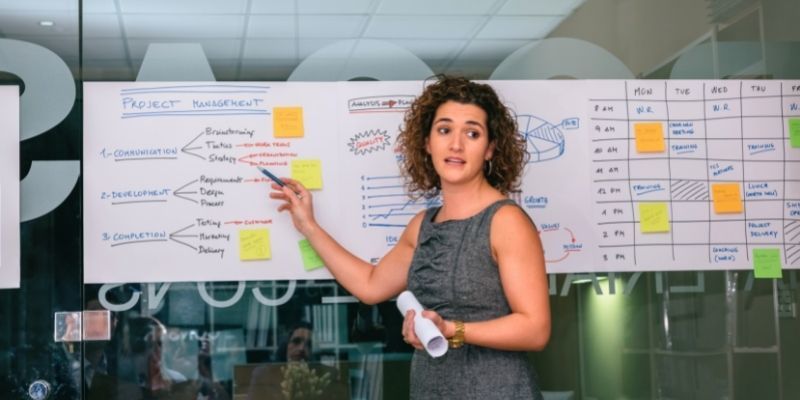Explained: The Project Management and Service Management Cycle
Explained: The Project Management and Service Management Cycle
Every business has targets, goals, and a vision that needs to be realised. To achieve these objectives, plans are carefully and strategically put in place. For a project to succeed, it requires a team of professionals to come together to complete a series of tasks, each of which is aligned with a common goal and project delivery.
All projects need to be managed, but the role of a Project Manager is much more than delegating jobs within a team. There are various methodologies to consider, as well as the process of change management and service management, all of which can be considered part of the overall business cycle.
If you are keen to pursue Project Manager jobs or you are interested in specialising in change or service management, then continue reading to learn about the overall cycle. With this knowledge, you can consider your career options and the project management courses you can enrol on to get trained to the highest level.
What is the Role of a Project Manager?
A Project Manager job description can vary, but essentially, a professional in this role has core roles and responsibilities. These include implementing a project plan, as well as organising the tasks and steps of each project, and directing the completion of tasks. Alongside these steps, you will be responsible for making sure that each project is delivered on time and within budget.
Strategy is an essential component of project management as you will be taking the project from inception to completion. This enables you to shape the process and control the direction in which the project develops. Essentially, there is a project life cycle that you will oversee and manage, and the steps include:
- Initiating
- Planning
- Executing
- Monitoring and controlling
- Delivery
All of these steps need to be ticked off a checklist, but one of the most important project management tools is the methodology used to deliver a project. The most popular and widely used methodology around the world is PRINCE2®.

What is PRINCE2® Project Management?
PRINCE2® is the most used process-based method of project management across the globe as it is an approach that can be used in every industry across all sectors. The framework is structured, clear, and defined, focusing on themes, principles, and processes, such as:
- Change and risk management
- Project planning
- Quality assurance
- Lifecycle
This structure enables certified professionals to ensure that projects are viable and profitable. While PRINCE2® provides direction and a clear structure, it can be tailored and adapted to all projects, regardless of size and purpose. This makes it the go-to approach for many industries around the world.
Individuals and organisations can benefit from this form of project management training as you will be able to introduce a consistent and controlled approach that allows for regular progress reviews. PRINCE2® project management also helps managers check that the direction of the project continues to align with business goals.
How to Get Qualified in PRINCE2® Project Management
There is no doubt that becoming certified as a PRINCE2® Practitioner will enhance your career prospects, whether that is upskilling to take on more responsibility at your current organisation, or for future job prospects.
To perfect PRINCE2®, you can undergo accredited project management courses that specialise in this methodology. With learndirect, you can enrol on globally recognised PRINCE2® project management courses, which will teach you the principles, processes, and themes needed to implement this approach.
Our accredited courses will also delve into the benefits of having a structured approach, and the various lifecycle models for projects. Our course offering comes in three levels, including Foundation, Practitioner, and combined. You can also enrol on the below courses in one of three delivery methods, including eLearning, on demand, and virtual classrooms:
- PRINCE2® Foundation (including exam)
- PRINCE2® Practitioner (including exam) – please note that you need to be certified at the Foundation level to enrol on this course
- PRINCE2® Foundation and Practitioner (including exam)
What is Agile Project Management?
While introducing a structured approach is important when it comes to planning and delivering projects, there must be room for adaptability. This is because we live in a fast-paced world in which consumer needs are constantly evolving and changing at a rapid rate. Having a level of flexibility is crucial, and this is where Agile comes in.
Agile Project Management (AgilePM®) offers a structured yet lean approach that allows for quick responses so that high-priority initiatives are put in place. If you work in an organisation that requires visibility around project management, then AgilePM® is a desired style, especially as it fits into a fast-paced environment that expects change.
You are probably wondering ‘why use Agile project management?’ Well, by using this style, you will bolster your project success rates and enhance your time-to-market expectations. Having knowledge of this process will enable you to implement effective change delivery.

How to be an Agile Project Manager
To be considered for Agile Project Manager jobs, you need to be certified at this level. You can do this by studying accredited courses that specialise in this style of project management. We deliver a range of AgilePM® courses that will get you certified to industry standard.
During your Agile project management training, you will delve into the philosophy and principles of the style, as well as project variables. You will get to grips with the DSDM method, as well as key practices MoSCoW and Timeboxing.
With learndirect, you can choose an Agile project management course that reflects your existing knowledge and experience. We have an option for beginners and experienced professionals alike. This style works alongside various approaches, including PRINCE2®.
Our AgilePM® courses are delivered in three methods, including eLearning, on demand, and virtual classrooms. You can select from one of the following courses:
- AgilePM® Foundation (including exam)
- AgilePM® Practitioner (including exam) – please note that you need to be certified at Foundation level to enrol on this course
- AgilePM® Foundation and Practitioner (including exam)
How to be a Project Manager with PRINCE2 Agile®
By now, you will understand the methodology of PRINCE2® and Agile project management. Now, you can learn the benefits of combining these two practices together. PRINCE2 Agile® is the most complete project management method in the world.
This process is adopted by businesses and organisations of all industries, offering a clear and defined framework that allows for incremental development. Professionals skilled in this project management certification will be able to introduce a forward-thinking approach that is flexible and can be adapted and reviewed continuously.
You get the best of both worlds when you adopt this method, with the main properties being the following:
- Structure and direction
- Flexible and adaptable
How Can I Study these Project Management Courses
Many professionals have already mastered the PRINCE2® method, and they go on to learn the Agile style, but if you are at the beginning of your career path, then you can study the combined certification.
By studying PRINCE2 Agile®, you will confidently run and oversee projects, using the principles, themes, and processes of PRINCE2® through an Agile lens. With learndirect, you can enrol on one of our courses that covers the theoretical and practical elements of this combined project management method.
We cater to both beginners and experienced professionals in our project management courses, covering Foundation and Practitioner levels either combined or separate. Our courses are also delivered via eLearning, on demand, or virtual classrooms. The courses are:
- PRINCE2 Agile® Foundation (including exam)
- PRINCE2 Agile® Practitioner (including exam) – please note that you need to be certified at Foundation level to enrol on this course
- PRINCE2 Agile® Foundation and Practitioner (including exam)

What is Change Management?
The project itself is the first step in working towards a business goal or in developing a product or service. The planning and executing process may already be in motion, but there are elements that surround a project that require additional skills and strategies. One of those is change management, also known as programme management.
It is important to learn how to manage change when it comes to factors involved in a project. So, what is change management? It is a term used to refer to the processes used to handle change within a project and the team working on it.
Essentially, any factors that can impact the project or its tasks and processes will fall under change management principles. Most organisations will have a change management team that works alongside the Project Manager.
The change management process is not linear, but there are four main types of change management tools, all of which can be tailored to the structure of a project. These types consist of:
- Reactive – Crisis situations tend to be when a reactive change management approach is taken. As the term suggests, when implementing a reactive strategy, the Project Manager will have to make quick decisions and won’t have much time to plan. This is not a favoured change management process, but sometimes it is unavoidable
- Anticipatory – This particular change management theory involves anticipating changes before they happen, giving you time to plan as far in advance as possible. This is usually used for instances when employees choose to leave a business or when teams are expanded
- Strategic – Often, strategic change management models are implemented with wider business goals being in mind. A change of strategy in project management could switch the entire trajectory of the project
- Incremental – This change management process is one that causes the least disturbance as it refers to small changes, updates, or additions, over a sustained period of time
Change management strategy is important in managing projects as you need to keep up with the fast pace of your industry, regardless of what sector your business or organisation is in. Elements of a project can change all the time, so having a solid change management plan will help you be as prepared as possible.
The Best Way of Managing Successful Programmes
To cope with any level of change within a project, there are approaches and methods that you can follow to best manage and adapt to the situation. Managing Successful Programmes (MSP®) is an internationally recognised framework that allows for a fluid approach with minimal risk.
One of the problems of adapting a project to meet ever-changing consumer needs is the risk that comes with it. With the help of MSP®, you can master practices that will allow you to alter the strategy of a project while still achieving business objectives and goals.
If you are looking to perfect these skills and learn how to confidently manage change to drive business goals and enhancements, then consider enrolling on our MSP® accredited courses. During your studies, you will explore the processes, principles, and themes, as well as the roles and responsibilities of MSP®.
Our courses are designed to provide you with the theoretical and practical elements of MSP®, one of the most effective change management processes. Each of the below courses are delivered via eLearning, on demand, and virtual classrooms:
- MSP® Foundation (including exam)
- MSP® Practitioner (including exam) – please note that you need to be certified at Foundation level to enrol on this course
- MSP® Foundation and Practitioner
What is IT Service Management?
IT service management is a process that involves the delivery of IT services to an organisation’s customers. Almost every industry across the globe uses a form of IT to deliver products and services. While project management focuses on temporary projects that meet a certain goal, service management is an ongoing approach and strategy.
If you are hoping to pursue IT service management jobs, then it is important that you understand the five lifecycles that this approach involves. They include:
- Service strategy
- Service design
- Service transition
- Service operations
- Continuous service improvement
Rather than just focus on the management of IT software, an IT service management model focuses on the wider functionality of these systems, which can be managed and used to support and meet customer needs for various businesses and organisations.
While there are fundamental differences between IT service management and project management, they both aim to fulfil business goals while using process-based methods.

What is the Role of ITIL within IT Service Management?
ITIL® Service Management is a globally recognised framework that is designed to assist businesses in providing value through their products and services. With the world becoming more reliant on technology, online services are used by almost all businesses and organisations.
Because of this, there is pressure to keep up with digital changes and the ever-changing demand of consumers. ITIL® Service Management is a world-leading framework that implements a digital operating model that helps businesses co-create value from products and services that are IT supported.
If you are new to this method, then the best avenue to go down is the ITIL® Service Management v4 Foundation course, which covers the following:
- ITIL® seven guiding principles
- Service value chain
- Four dimensions of service management
Once you have gained this nationally recognised certification, you will be able to confidently improve the use of IT processes and roll out new IT services that will help enhance value. ITIL® is a method that is widely used by plenty of established organisations, such as NASA, HSBC, and IBM.
With learndirect, you can achieve your accredited certification via our online course, which is delivered in three different methods, including eLearning, on demand, and virtual classrooms. Please note that each one includes the exam in the respective course package.
We also provide specialist courses in IT service management that are targeted towards individuals looking to either go down the ITIL® Managing Professional or ITIL® 4 Strategic Leader route. These courses include:
- ITIL® 4 Transition to Managing Professional (including exam)
- ITIL® 4 Specialist Create, Deliver and Support (including exam)
- ITIL® 4 Specialist High Velocity IT (including exam)
- ITIL® 4 Specialist Direct, Plan and Improve (including exam)
Any learner who chooses to enrol on any of the above courses must be certified at ITIL® Foundation level. Also, each one is delivered through our eLearning method.
Benefits of Our Project Management Training Online Courses
As mentioned throughout this piece, our project management, change management, and service management courses are delivered either through eLearning, on demand, or virtual classrooms. Every option is accessed online, which means that you can achieve an accredited certification from the comfort of your own home.
To complete the course, all you require is a computer, laptop, or tablet, and a stable internet connection. With all of these elements, you will gain access to everything you need to complete the course and prepare for your exam. Plus, most learners only take a matter of days to complete their course, so you can get certified very quickly!
Below, we have explained the different delivery methods:
- eLearning – This platform delivers our project management, programme management, and service management courses through a series of online interactive exercises and video presentations
- On Demand – For learners who are keen to experience a traditional classroom atmosphere but cannot commit to scheduled lessons, then we offer an on demand learning platform. Courses delivered this way will enable learners to watch online classes in their own time. They can repeat lessons and skip over modules at their leisure
- Virtual Classrooms – Rather than attend lessons in person, you can attend our virtual classrooms, which are led by experienced trainers. During each lesson, you will be able to ask the trainer questions. You will also be able to watch the lessons independently if you cannot attend the live online class
Not every course is delivered in all three learning methods, so please check the options before you enrol. Please note that all exams are delivered online, and it is advised that you book in your preferred timeslot at least 2 weeks in advance.

Get Trained Up Today!
Whether you are an aspiring Project Manager or you want to expand your skillset and better serve your organisation, we have the online courses for you. To enrol, speak to one of our Course Executives today on 01202 006 464 or reach out to us online. Take significant steps forward in your professional career today!
















